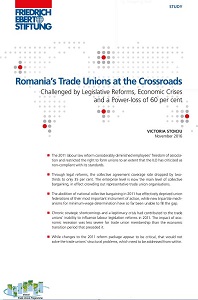Romania’s Trade Unions at the Crossroads. Challenged by Legislative Reforms, Economic Crises and a Power-loss of 60 per cent
Romania’s Trade Unions at the Crossroads. Challenged by Legislative Reforms, Economic Crises and a Power-loss of 60 per cent
Author(s): Victoria Stoiciu
Subject(s): National Economy, Human Resources in Economy
Published by: Friedrich Ebert Stiftung
Keywords: Romanian Trade Unions;
Summary/Abstract: The 2011 labour law reform considerably diminished employees’ freedom of association and restricted the right to form unions to an extent that the ILO has criticized as non-compliant with its standards. // Through legal reforms, the collective agreement coverage rate dropped by twothirds to only 35 per cent. The enterprise level is now the main level of collective bargaining, in effect crowding out representative trade union organisations. // The abolition of national collective bargaining in 2011 has effectively deprived union federations of their most important instrument of action, while new tripartite mechanisms for minimum-wage determination have so far been unable to fill the gap. // Chronic strategic shortcomings and a legitimacy crisis had contributed to the trade unions’ inability to influence labour legislation reforms in 2011. The impact of economic recession was less severe for trade union membership than the economic transition period that preceded it. // While changes to the 2011 reform package appear to be critical, that would not solve the trade unions’ structural problems, which need to be addressed from within.
Series: Friedrich Ebert Stiftung Rumänien
- Page Count: 20
- Publication Year: 2016
- Language: English
- Content File-PDF

